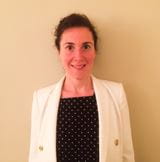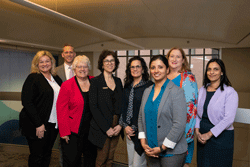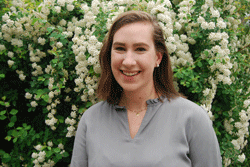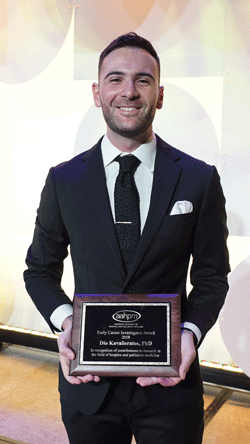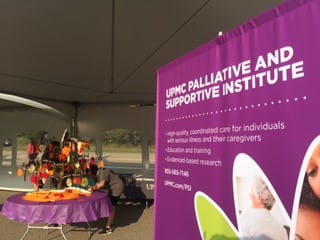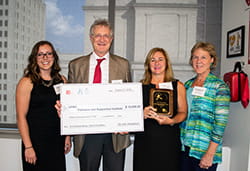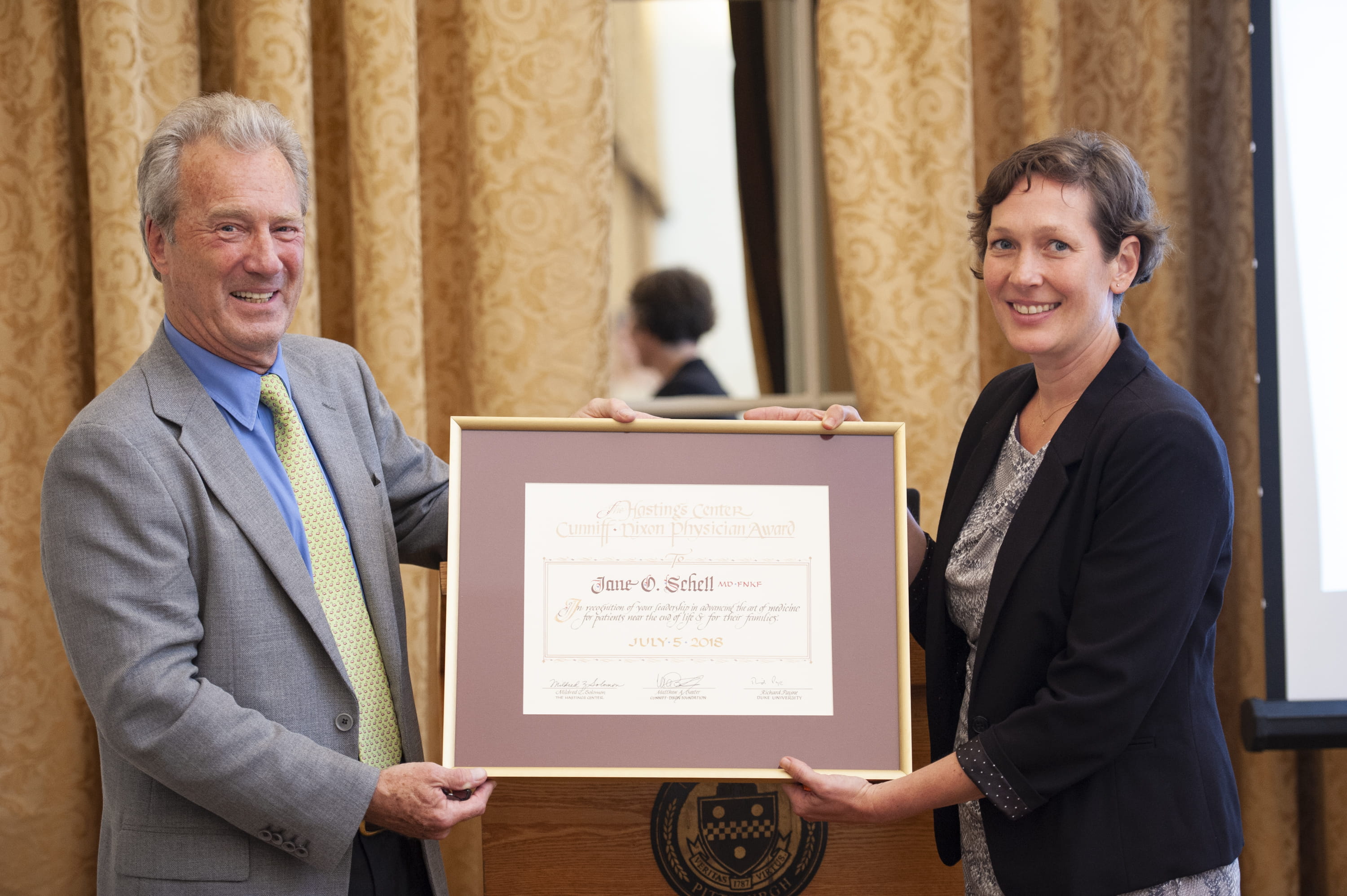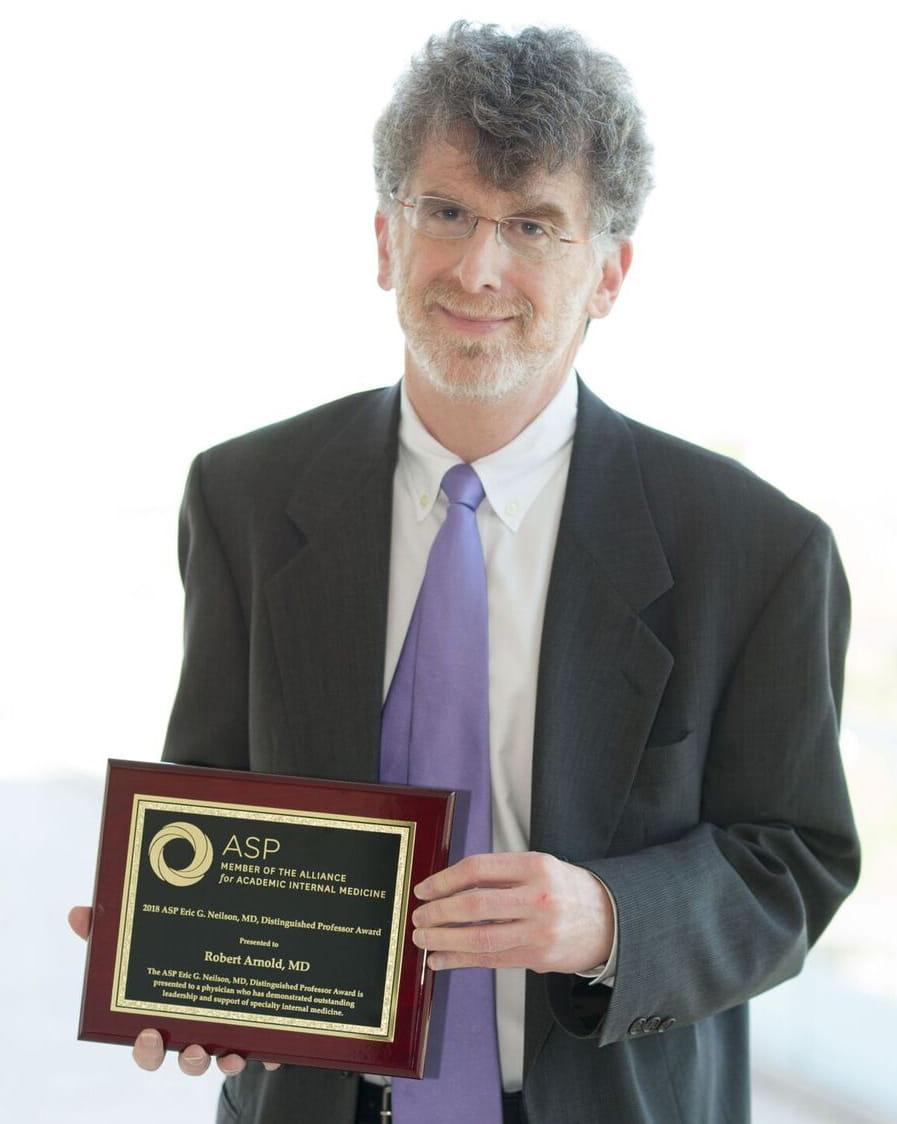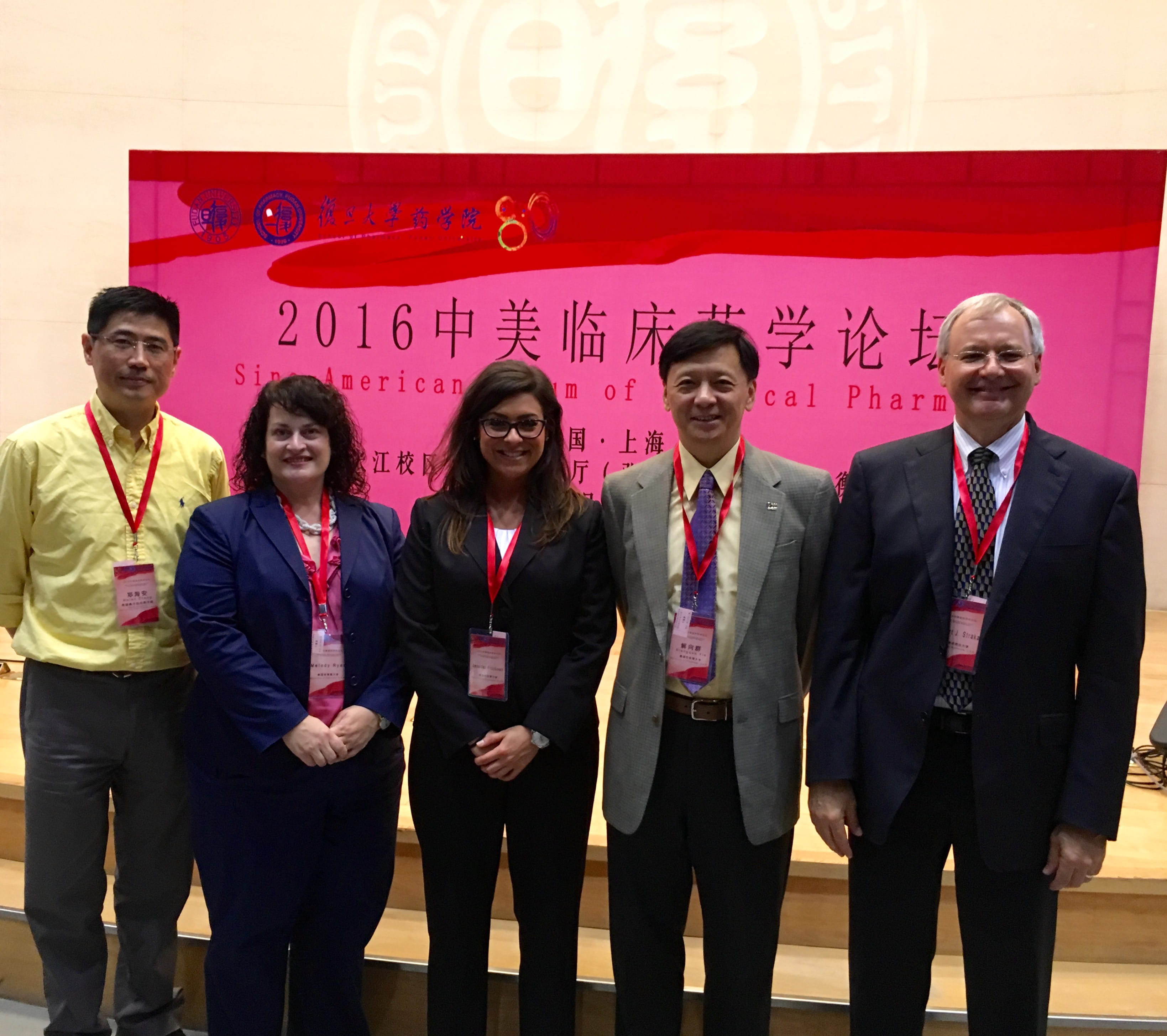Patient shares final visit with beloved animals
Becca Hoelsken, CRNP, UPMC Palliative and Supportive Institute, and her UPMC Shadyside colleagues in nursing and administration recently coordinated a visit from two horses and a dog on behalf of a dying patient.
In conversations with Diane, the patient, who was recovering from COVID-19 and newly diagnosed with metastatic brain cancer, Becca learned that she cherished her pets, including two cats, a dog, and a horse named Jorden. Diane had ridden Jorden for more than 20 years, but the horse was retired and now boarded at a nearby farm. Becca recognized Diane’s deep sadness around the absence of these important relationships. She reached out to hospital administration late one Friday afternoon to request permission for an outdoor visit from the patient’s horse on hospital grounds.
Forty-eight hours later, on a Sunday afternoon, Diane was transported outside to the hospital courtyard where Jorden, a miniature support horse for Jorden named Timbuck, Diane’s dog, Princess, and several family members were gathered for a visit. Those present, including Becca, noted that multiple patients watched from their own windows above, and a physician delivered apples for the horses.
Those who participated in the experience expressed deep gratification at having brought comfort to Diane as her days drew to a close. Acting upon what was still possible and meaningful, even when death was near, made a difference for this patient and for her family.
Anti-racism and Social Justice
Initiatives addressing these issues extend throughout palliative care from teaching to research to interactions with our colleagues and our community.
Eva Reitschuler Cross, MD participates in an anti-racism and social justice committee comprised of about ten PSI staff and faculty colleagues. She acknowledges that recent events including the killing of George Floyd and the COVID-19 pandemic have compelled many to move past outrage to action. “We are pursuing how we can educate ourselves and how we can engage others in a meaningful, sustained manner around these huge societal problems.”
In the realm of education and training, Robert Arnold, MD, FAAHPM and Yael Schenker, MD, MAS, FAAHPM are leading the Expanding Palliative Education, Research and Training (ExPERT) Program. This program partners with three minority-serving institutions: Morehouse School of Medicine, Howard University, and the University of Puerto Rico to implement a palliative care curriculum for medical students, residents, and fellows. It also provides resources and training for their faculty to build a sustainable palliative care educational infrastructure within their program.
Locally, Rebecca Sands, DO, program director for the Hospice and Palliative Medicine Fellowship, reports a rising interest among fellows related to a curriculum on diversity; this will be implemented in the next academic year.
Dr. Jessie Merlin, MD, PhD, MBA is part of the Rapid Response Team assembled by the dean of the School of Medicine at the University of Pittsburgh to address racism and xenophobia. Additionally, she and her colleague, Maya Ragavan, MD MPH, MS, are spearheading a research initiative to develop anti-Black racism interventions for non-Black faculty. “My hope is that we can develop an intervention that engages non-Black faculty in improving the well-being and existence of Black faculty in the medical school space. Previous diversity and inclusion efforts have left Black faculty alone, largely. This puts the weight of executing changes on non-Black faculty,” explains Dr. Merlin.
In terms of community outreach, Rabbi Jonathan Perlman, chaplain and bereavement and spiritual coordinator for PSI at UPMC Shadyside, has been engaged with the leadership of Rodman Street Missionary Baptist Church for many years. The church has a large lay ministry program to provide support to homebound, ill congregants in health care facilities. Says Rabbi Perlman, “Despite what reports show about inequities in the health care system, Black churches promote full wellbeing and use their ministry to educate their members. It is a spiritual directive.”
Working with the church leadership, Rabbi Perlman, palliative care social worker Tanisha Bowman, and Drs. Keith Lagnese and Richard Weinberg surveyed the lay ministers about their attitudes and knowledge pertaining to hospice and palliative care. While members had considerable positive experiences with hospice, the survey showed concerns about costs, services at home, palliative care, and quality of care at the end of life. The PSI team addressed these concerns in a one-hour virtual conference, connecting with 39 members of the church. Future efforts will build on this foundation in working with other churches and groups serving the Black community. “The goal is to undo systemic racism within the health care arena,” says Rabbi Perlman.
Grant for Schwartz Rounds series support staff wellness
With funding from UPMC Presbyterian, Karl Bezak, MD is leading the implementation of a Schwartz Rounds series. This recutting interdisciplinary forum will provide an opportunity for all health care professionals at UPMC Presbyterian to connect and share their experiences in caring for patients and families dealing with serious illness.
Says Dr. Bezak, “It’s a safe, confidential space for all health providers to meet and learn more about each other’s roles, stresses, and successes to share in a common humanity and foster compassion and collaboration.”
This forum is intended to enhance provider understanding, collaboration, wellness and resilience as they strive to provide high-quality, compassionate care to patients and their families. The launch is planned for early 2021.
Gleitsman Fellowship in Palliative Care Awarded
Chandler Mitchell, a University of Pittsburgh medical student, received an award from The Alan Gleitsman Student Research Fund in Palliative Care, which provides $3,000 for summer learning in the Palliative Care Program.
Under the guidance of Yael Schenker, MD, Chandler is researching the role and impact of shared care plans (SCPs) in a primary palliative care intervention (CONNECT) for patients with advanced cancer.
“I have worked on the CONNECT trial since 2016,” Chandler said. “My interest in the effects of SCPs originated through my work evaluating audio recordings of CONNECT visits. SCPs foster a collaborative dialogue between CONNECT nurses and patients to identify one or more symptoms and create a treatment plan based on each patient’s individual needs and lifestyle.”
In the years since Chandler has been working with Dr. Schenker, he has continuously pursued clinical and research opportunities with her team.
“My experiences on the CONNECT trial and working alongside Pitt palliative care physicians have shaped my view of medicine and how I envision my future within it,” Chandler said. “This project will allow me to develop my clinical research skills under Dr. Schenker’s mentorship. And, it will help me further understand the unmet needs faced by patients suffering from advanced illness and the effect of primary palliative care on improving their quality of life.”
Local palliative care doctors support New York City colleagues and patients during COVID-19
Like so many, Karl Bezak, MD and Taylor Lincoln, MD want to do everything they can to alleviate the suffering of patients, families, and colleagues impacted by the COVID-19 pandemic. Both are among a group of ten UPMC and University of Pittsburgh palliative care physicians who readily offered their services when Robert Arnold, MD, FAAHPM, medical director for the UPMC Palliative and Supportive Institute (PSI), reached out to solicit help from among his colleagues on behalf of the Mt. Sinai Health System.
With more than 16,000 deaths to date, the people of New York City have been the hardest hit by the pandemic. As Dr. Bezak expressed, “While we were bracing for the storm here in Pittsburgh, New York City was in it.” Dr. Lincoln noted that administrative leadership from both Mt. Sinai and UPMC worked with incredible agility to accelerate physician credentialing and make this collaboration possible.
The clinical support takes two forms, both virtual. Our palliative care physicians are participating in goals of care conversations with patients, families, and colleagues in the inpatient setting. Additionally, Mt. Sinai is operating “PATCH-24,” a telephone hotline fielding inquiries related to palliative care and COVID-19. Physicians can help identify a primary decision-maker to speak on the patient’s behalf should he or she become unable to do so; this may involve patients who are symptomatic and still awaiting diagnosis.
Clearly, the practice of medicine is being transformed by COVID-19. Both Dr. Bezak and Dr. Lincoln see its current and future impact as it pertains to palliative care. “Without enough palliative care specialists to meet the demand, telemedicine can help increase patient and family access,” says Dr. Lincoln. Dr. Bezak agrees that virtual interventions can bring needed services to existing “palliative care deserts.” Additionally, he anticipates that telemedicine will be incorporated across core competencies for physicians-in-training.
View this video produced by local physicians as a gesture of support for their colleagues.
Fostering Comfort and Community through Music
MusiCare, a University of Pittsburgh School of Medicine student volunteer initiative, has gone virtual to adapt to the COVID-19 pandemic.
With guidance from faculty advisor Jane Schell, MD FNKF, medical students early on in their training and faculty who are also musicians and vocalists have created a YouTube channel, MusiCare Connections, featuring recorded performances intended to provide connection and comfort to patients.
Since 2014, MusiCare volunteers have been performing in UPMC hospital settings including UPMC Children’s Hospital and the dialysis unit at UPMC Presbyterian, gathering monthly to lend a human touch to patients’ clinical experiences.
Now Accepting Applications for the 2020 Amdur Fellowship in Social Work
Awarded annually, this fellowship affords an opportunity for mentoring in the field of clinical social work for candidates with previous clinical experience who wish to specialize in palliative care. This is a one-month clinical rotation at UPMC Presbyterian and Family Hospice, part of UPMC. Apply here (PDF). The deadline for applications is April 15, 2020.
Honors
Tanisha Bowman, LSW, Palliative and Supportive Care, UPMC Presbyterian, has been honored with the Kristin Bowser Emerging Social Work Leader Award by the Pennsylvania chapter of the National Association of Social Workers.
Robert Arnold, MD, FAAHPM has been recognized by AAHPM with the 2021 Award for Excellence in Education and Training. Dr. Arnold is the first recipient of this award.
Dr. Rachel Rodenbach, a fellow in the Section of Palliative Care and Medical Ethics, was recognized by the American Academy of Hospice and Palliative Medicine for her top scoring Quality Improvement research and poster submission. Dr. Rodenbach completed this project under the mentorship of Dr. Julie Childers.
Julie Wilson Childers, MD, MS, FAAHPM, is the 2020 recipient of the Mid-Career Physician Award, one of only five physicians to be honored with a Hastings Center Cunniff-Dixon Physician Award for exemplary service to patients near the end of life. Dr. Childers is medical director of the palliative care service at UPMC Presbyterian and is senior associate with VitalTalk. Her writing and teaching work has focused on goals-of-care discussions and managing addiction among patients who are nearing the end of life.
Presentations
Julie Childers, MD, MS, FAAHPM participated in a panel discussion on behalf of the National Academies of Sciences, Engineering, and Medicine. Hear Dr. Childers’ contribution to the two-day workshop on Quality Care for People with Serious Illness beginning at minute 58.
Publications
Robert Arnold, MD, FAAHPM and Jane Schell, MD FNKF co-authored “There Is No I in Team: Building Health Care Teams for Goals of Care Conversations” which appeared in the Journal of Palliative Medicine.
Judith Resick, MSN, MPH, RN and Dr. Schenker collaborated on Primary Palliative Care for Patients with Advanced Hematologic Malignancies: A Pilot Trial of the SHARE Intervention, also in the Journal of Palliative Medicine.
Robert Arnold, MD, FAAHPM contributed to this piece from the Annals of Internal Medicine. He and his VitalTalk co-authors contend that “it is possible to get better at facing inequality, suffering, and dying, regardless of the circumstances.”

















